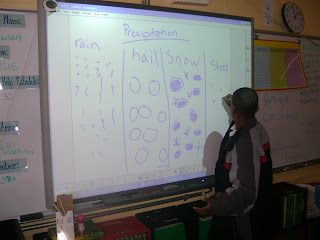I recently taught an inquiry lesson that was focused on atmospheric cycles. The lesson was focused on the water cycle and how rain drops are formed. Scenarios provided real world contexts were included in the lesson, such as modeling air molecules or asking “Have you ever been outside and the sun was shining, then all of a sudden it starts pouring down rain?” “Have you ever been outside and it was hot and the air felt sticky and moist, it was very humid? “We activated background knowledge by discussing and illustrating the 4 types of precipitation and the 3 types of clouds. We then watch a video segment from discovery education that focused on the water cycle as part of my motivation for the lesson. The lesson was an inquiry based lab experiment. We then extended the lesson by creating diagram of the water cycle. The diagram allowed students to illustrate and label, so the students were able to display their knowledge in an informal assessment. The students seemed well engaged and asked question for clarity and curiosity during the activity. The students demonstrated their understanding of the content area through a variety of methods such as bell work (lesson review/TCAP prep), Q and A during the Discovery Education video segment (building background knowledge), working cooperatively in their groups (Inquiry Lab Activity) and their conclusion answering the guided question, completing the graphic organizer and the extension activity. The students are now able to put an experience with concept of water vapors and the stages of the water cycle along with the influences such as temperature. The students exercised knowledge of the scientific method. They also progress through the lesson with conversations that utilize scientific vocabulary.
There are many things that I gained knowledge of from informally assessing my student. I learned that my students are very visual, anything they can see, touch or create causes more interested and eagerness about learning. I tried to make this lesson visually stimulating and engaging. The students were very alert and receptive to this lesson and I was able to see their mind blossom with curiosity throughout the experiment. There are several things that I would like to implement to ensure that the lesson is more effective and efficient so students to gain optimal learning experience. I would make adjustments on my transition methods so students aren’t distracted or restless between activities. I would have students turn in their bell work at the end of class instead of when I passed out the lab activity sheet. I would also spend less time on the bell work to ensure that actual lesson has enough time. I would also make adjustments on my transition methods to better monitor the process of passing out materials. I would also like to have napkins for each group just in case they are needed so that students will not need to leave the room. I would have the students turn in their lab sheet and pick up the copy paper for the enrichment assignment sheet instead of me passing them out because the students finished at different paces and they were sitting on different sides of the room, so this was not an effective method. |













It looks like you had a lot going on for this lesson. You students seem very engaged from the photos and very thoughtful in their responses. I really like the drawings they created to represent the water cycle. They put a lot of detail in the pictures and the labeling. Don't beat yourself up too much about some of the logistic things. It's most important that your students were engaged and really seemed to increase their depth of knowledge.
ReplyDeleteLooking at the photos the students were well engaged and focused on the investigation at hand. By informally assessing students like you did you can gain plenty of information concerning their learning styles. The lab sheets and the diagrams demonstrated appropriate content knowledge. You also integrating technology into the lesson with the use of a SMART Board.
ReplyDeleteTransitions can be difficult for any teacher to manage. What I usually do when groups finish before others is have them create a word search or crossword puzzle using science verbiage pertaining to the lesson at hand.
Question! Alana, did you devise this lesson yourself or did you adapt from a curriculum you are using? Would like more information. In NJ water cycle is a science standard to be covered in 4th grade.
Nicely done1
Thanks you all. I remembered doing a lesson similar to this in class in undergrad. So I recreated the lesson because the curriculum covered atmospheric cycles and water cycle was one of them. I don't have any lab equipment so I often create or focus or a part of a lesson that I can afford to make into experiment.
ReplyDeleteAlana,
ReplyDeleteI appreciate how you had the students doing so many different activities which really brought in the multiple intelligences and different learning styles. The diagrams the students drew are really detailed and really show their knowledge. Love your integration of using the SMART board!
~Charity